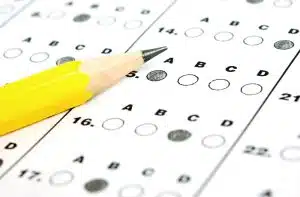What Are Johns Hopkins’ GPA and SAT Requirements?
Applying to Johns Hopkins University? It’s important to know about their GPA and SAT requirements. These criteria are central to their admission process, indicating if you’re ready for their academically rigorous environment.
Johns Hopkins GPA Requirements
Your high school GPA is a significant factor in your Johns Hopkins University application. It’s reflects your academic discipline and ability to handle challenging coursework, which are key qualities that Johns Hopkins looks for in prospective students.
Johns Hopkins University considers several aspects of your GPA:
- High School Courses Taken: The types of courses you’ve completed give insight into your academic interests and strengths.
- Course Rigor: Advanced Placement (AP), International Baccalaureate (IB), and honors classes can positively impact your GPA, showing your willingness to challenge yourself academically.
- Class Rank: Where you stand in your graduating class can offer context to your GPA, especially in competitive or less competitive high schools.
- Grade Trends: Consistency or improvement in your grades throughout high school is a good indicator of your dedication and ability to adapt to increasing challenges.
- School Profile: Johns Hopkins considers the context of your education, including the competitiveness and resources of your high school, which can affect GPA interpretation.
Does Johns Hopkins have a minimum GPA requirement?
Johns Hopkins University does not enforce a strict minimum GPA requirement. This policy aligns with their holistic admission approach, where they consider the entire application, not just academic metrics.
However, a strong GPA is still crucial due to the competitive nature of the admissions process.
Johns Hopkins average GPA
Despite the lack of a minimum GPA requirement, it’s important to understand the GPA landscape among admitted students. The average GPA of students admitted to Johns Hopkins is around 3.93.
This high average indicates the caliber of students the university typically admits and the level of academic excellence they expect.
An average GPA of 3.93 at Johns Hopkins places it among the most selective institutions in the country. This figure is well above the national average for high school GPAs, signaling that Johns Hopkins students typically excel academically.
When considering these GPA statistics, remember they represent an average. Applicants with lower GPAs should not be discouraged from applying, especially if they have strengths in other areas of their application. However, aspiring to meet or exceed this average can strengthen your application significantly.
GPA tips for Johns Hopkins
Aiming for a GPA of 3.93 or higher is advisable when applying to Johns Hopkins University. This target aligns with the average GPA of admitted students, positioning you competitively in the applicant pool.
To reach and sustain the desired GPA for Johns Hopkins University, consider the following strategies:
- Focus on core academic subjects. Prioritize your performance in core subjects like Math, Science, English, Social Studies, and Foreign Languages.
- Take advanced courses. Enroll in AP, IB, or honors courses if available. These challenging courses demonstrate your academic ambition and can positively influence your GPA.
- Seek help when needed. Don’t hesitate to get tutoring or extra help in subjects where you struggle. This shows a commitment to learning and improving.
- Manage your time wisely. Develop strong time management skills to balance academics with extracurricular activities.
- Stay consistent. Aim for steady, high performance throughout your high school years rather than relying on last-minute improvements.
- Engage in class. Active participation and engagement in class can boost your understanding and performance in subjects, contributing to a higher GPA.
- Prepare for exams thoroughly. Regular and systematic preparation for tests and exams can help you achieve high grades consistently.
Can I get into Johns Hopkins with a low GPA?
You can still be a competitive applicant to Johns Hopkins University even with a lower GPA. Remember, their admission process is holistic. This means they consider more than just your GPA.
If your GPA isn’t as high as you’d like, you can still demonstrate your potential in other ways. Showcase your strengths, talents, and unique experiences that can compensate for a lower GPA.
While GPA is important, Johns Hopkins also places significant weight on other aspects of your application:
- SAT/ACT Scores: High standardized test scores can help balance a lower GPA.
- Extracurricular Activities: Leadership roles, volunteer work, internships, or involvement in sports and clubs show your skills beyond academics.
- Personal Essays: Use your essays to tell your unique story, explain any challenges you faced that impacted your GPA, and how you’ve grown from them.
- Letters of Recommendation: Strong recommendations from teachers or mentors can provide insights into your character, work ethic, and potential that grades alone cannot show.
- Special Talents or Achievements: Highlight any special talents, awards, or significant achievements in various fields that can make your application stand out.
Each part of your application offers an opportunity to show why you would be a great fit for Johns Hopkins University, even if your GPA isn’t perfect.
Johns Hopkins SAT Requirements
Your SAT score plays a significant role in your Johns Hopkins University application. A strong SAT score can complement your academic record, showing your readiness for the challenging curriculum at Johns Hopkins.
While the university employs a holistic admissions process, a high SAT score can make your application more competitive, especially if your GPA is slightly below the average of admitted students.
A good SAT score is a key indicator of your standardized test-taking abilities and your grasp of fundamental academic concepts in areas like math, critical reading, and writing.
Does Johns Hopkins have a minimum SAT requirement?
Johns Hopkins University does not have a minimum SAT score requirement. However, understanding the SAT score statistics of admitted students is crucial to gauge the level of competition and the caliber of students the university typically admits.
Johns Hopkins average SAT
Here are the typical SAT scores of successful Johns Hopkins applicants:
| Average SAT Score | 25th Percentile SAT Score | 75th Percentile SAT Score |
| 1540 | 1520 | 1560 |
These SAT scores are significantly higher than the national average, positioning Johns Hopkins among the most selective universities in terms of standardized testing. The scores reflect the high academic standards expected from students at Johns Hopkins.
Scoring in the 75th percentile (1560) positions you as a highly competitive applicant in terms of standardized testing.
However, scoring at the 25th percentile (1520), while still impressive, suggests that other parts of your application should be particularly strong to compensate. This might include exceptional extracurricular achievements, outstanding essays, or strong letters of recommendation.
Essentially, a score closer to the 25th percentile means the rest of your application needs to shine brighter to make an impact. Remember, Johns Hopkins’ holistic approach means they value diverse talents and experiences, not just test scores.
SAT tips for Johns Hopkins
To aim high for Johns Hopkins University, target an SAT score at or above the 75th percentile, which is 1560. Specifically, strive for a 770 in SAT Evidence-Based Reading and Writing and an 800 in SAT Math to position yourself competitively.
Here are some effective strategies and resources to help you prepare for the SAT:
- Familiarize yourself with the structure of the SAT, including types of questions, sections, and time limits.
- Practice with official SAT materials from the College Board to get a feel for the actual test.
- Identify and strengthen your weak areas through targeted practice.
- Enroll in an SAT prep course for structured learning and professional guidance.
- Regular, consistent practice can significantly improve your skills and test-taking strategies.
- Practice under timed conditions to improve your time management skills during the test.
- For the Evidence-Based Reading and Writing section, regular reading of a variety of texts can help enhance comprehension and analytical skills.
- Regular math practice, especially on topics covered in the SAT, is crucial for the Math section.
- Websites like Khan Academy offer free, high-quality SAT preparation materials.
- Maintain a positive attitude and confidence during your preparation and on the test day.
Johns Hopkins testing policy
Johns Hopkins University currently adopts a test-optional policy for standardized testing. This means that submitting SAT or ACT scores is not mandatory for admission.
Applicants have the choice to decide whether or not their test scores accurately represent their academic abilities and potential. If you believe your SAT or ACT scores are an asset, you can include them to potentially strengthen your application.
However, if you feel that your scores do not reflect your true potential, or if you were unable to take the tests due to extenuating circumstances, you can choose not to submit them without penalty.
In the absence of test scores, other aspects of your application, like GPA, coursework, essays, extracurricular activities, and letters of recommendation, will carry more weight. This shift allows you to highlight other areas of strength and demonstrate your readiness for Johns Hopkins University in different ways.
Remember, the holistic review process at Johns Hopkins looks at your entire application to gauge your fit and potential for success at the university.
Should I submit my SAT scores to Johns Hopkins?
Deciding whether to submit your SAT scores to Johns Hopkins University can be guided by understanding the behaviors of successful applicants. With 44% of enrolled students having submitted their SAT scores, this statistic offers insight into current trends.
This figure suggests that a significant portion of successful applicants chose to include their SAT scores as part of their application.
If your SAT score is strong, especially if it aligns with or surpasses the average or 75th percentile scores of admitted students, it can be advantageous to submit it. A high SAT score can enhance your application by demonstrating academic proficiency in standardized testing.
However, if your SAT score isn’t a strong representation of your academic abilities, or if you believe other parts of your application are more indicative of your potential, you might choose not to submit your scores. Johns Hopkins University’s holistic review process ensures that your application will be evaluated fairly, regardless of the inclusion of standardized test scores.
Ultimately, the decision to submit SAT scores should be based on how well you believe they represent your academic capabilities and potential contribution to the Johns Hopkins community.
Does Johns Hopkins superscore the SAT?
Johns Hopkins University officially superscores the SAT. This means that if you have taken the SAT multiple times, Johns Hopkins will consider the highest score from each section across all your SAT test dates when reviewing your application.
Superscoring can significantly benefit your application to Johns Hopkins. It allows you to focus on improving individual sections in subsequent tests without worrying about the other parts.
For instance, if you score high in Math on your first attempt but want to improve your Evidence-Based Reading and Writing score, you can retake the SAT with a focus on the latter, knowing that your highest Math score will still be considered.
This policy encourages you to take the SAT more than once to achieve your best possible score in each section. It’s an opportunity to present the strongest possible SAT scores in your application, potentially making your application more competitive.
Remember, while a high SAT score is advantageous, it’s just one component of the holistic review process at Johns Hopkins University.
Can I get into Johns Hopkins University with a low SAT score?
You can still be a competitive applicant to Johns Hopkins University even with a lower SAT score. Thanks to their holistic admissions approach, Johns Hopkins evaluates each component of your application, not just your standardized test scores.
While a high SAT score can be beneficial, other elements of your application are equally crucial:
- Academic Performance: A strong GPA, particularly in challenging courses, can show your academic ability and readiness for college-level work.
- Extracurricular Activities: Leadership roles, community service, internships, or participation in clubs and sports demonstrate your skills and interests beyond academics.
- Personal Essays: Your essays are your chance to tell your unique story, showcase your personality, and explain any challenges that may have affected your SAT scores.
- Letters of Recommendation: Recommendations from teachers or mentors can provide deeper insights into your character, work ethic, and potential beyond what test scores can show.
- Special Talents or Achievements: Unique talents or significant accomplishments in various fields can make your application stand out, showing that you bring more to the table than just test scores.
In summary, a lower SAT score isn’t an automatic disqualifier. Johns Hopkins University values diverse talents and experiences, and a well-rounded application can still position you as a strong candidate.
Can I get into Johns Hopkins if I didn’t take the SAT?
You can get into Johns Hopkins University even if you haven’t taken the SAT. Johns Hopkins’ test-optional policy demonstrates their flexibility and understanding that standardized test scores are not the only indicator of a student’s potential and academic capabilities.
If you decide not to submit SAT scores, or if you haven’t taken the SAT, there are several ways you can strengthen your application.
First, focus on showcasing your academic abilities through your high school GPA, particularly in rigorous courses such as AP, IB, or honors classes. Excelling in these challenging courses can demonstrate your readiness for the academic rigor at Johns Hopkins.
Your extracurricular activities also play a significant role. Engaging in leadership roles, community service, sports, arts, or other areas of interest can highlight your diverse skills and passions. Johns Hopkins values students who bring unique perspectives and experiences to their campus community.
Personal essays are another critical component. They provide an opportunity to share your story, perspectives, and aspirations. Well-crafted essays can give admissions officers a sense of who you are beyond grades and test scores, offering insights into your character, resilience, and how you handle challenges.
Lastly, letters of recommendation are equally important. Strong recommendations from teachers, counselors, or mentors who know you well can provide a more comprehensive view of your abilities, work ethic, and potential contributions to the university community.
In conclusion, not submitting SAT scores to Johns Hopkins University doesn’t diminish your chances of admission. By focusing on other strong aspects of your application, you can effectively demonstrate your readiness and potential fit for Johns Hopkins.
Johns Hopkins Admission Process
The admission process at Johns Hopkins University is holistic and comprehensive. This approach means every part of your application is carefully considered.
Your academic achievements, personal essays, extracurricular activities, and recommendations all play a vital role in the decision-making process. The goal is to understand you as a whole person, not just as a set of grades and scores.
While the admission process is multifaceted, GPA and SAT scores are still crucial. They are the primary academic indicators that Johns Hopkins uses to gauge your readiness for their rigorous academic environment.
High GPA and SAT scores can significantly boost your application, demonstrating your academic abilities and preparedness for university-level work. Remember, these scores are a key part of your application, but they are just one piece of the larger picture.
Johns Hopkins acceptance rate
Gaining admission to Johns Hopkins University is extremely competitive, with an acceptance rate of only 6.3%. This low rate highlights the university’s rigorous selection process, aimed at choosing the most talented and committed students.
Understanding the admission requirements for Johns Hopkins University is essential in such a competitive environment. Applicants who meet or surpass these standards have a better chance of being admitted.
In a pool of highly qualified candidates, it’s important to differentiate your application. Showcasing your academic strengths and unique experiences can make the difference in your application to Johns Hopkins University.
Other Ways to Boost Your Academic Profile for Johns Hopkins
When applying to a prestigious institution like Johns Hopkins University, it’s essential to consider various ways to enhance your academic profile beyond GPA and SAT scores. Here are some effective strategies:
- Advanced Coursework: If possible, enroll in advanced courses such as Advanced Placement (AP), International Baccalaureate (IB), or dual-enrollment college classes. These courses demonstrate your ability to handle college-level work and your commitment to academic excellence.
- Subject Tests or Additional Standardized Exams: Consider taking subject-specific standardized tests, such as SAT Subject Tests, if they align with your strengths and academic interests. These scores can provide additional evidence of your expertise in particular areas.
- Academic Competitions: Participate in academic competitions related to your field of interest. Success in these competitions can showcase your deep engagement and exceptional skills in specific subjects.
- Research Projects: Engaging in research projects, especially those that lead to presentations at science fairs or publications, can be a powerful way to demonstrate your intellectual curiosity and dedication to a particular field of study.
- Online Courses and Certifications: Taking relevant online courses and earning certifications can show your initiative to go beyond the standard curriculum and learn more about your areas of interest.
- Summer Programs: Participate in summer academic programs, especially those offered by universities. These programs can provide advanced learning opportunities and demonstrate your commitment to academic growth.
- Community College Classes: Taking classes at a local community college can not only show your ability to handle advanced coursework but also provide a taste of college-level academics.
- Academic Blogging or Publishing: Starting a blog or publishing articles on topics you’re passionate about can be a unique way to demonstrate your expertise and communication skills.
- Leadership in Academic Clubs: Taking on leadership roles in academic clubs or organizations at your school shows your ability to lead and contribute significantly to a field.
By incorporating some of these strategies into your preparation, you can significantly enhance your academic profile and appeal as a candidate to Johns Hopkins University. It’s about showing a proactive approach to learning and a deep engagement with your academic interests.
Conclusion
Both your GPA and SAT scores are important elements in your Johns Hopkins University application.
A strong GPA showcases your academic discipline and ability to handle rigorous coursework, while a high SAT score can provide evidence of your standardized testing skills and fundamental academic knowledge. These components play a critical role in demonstrating your readiness for the challenges and opportunities that Johns Hopkins offers.
However, it’s crucial to remember that Johns Hopkins University values a holistic approach to admissions. This means every part of your application—from your essays and extracurricular activities to letters of recommendation and personal achievements—contributes to their understanding of you as a candidate.
Therefore, it’s important to present a well-rounded application that reflects not only your academic strengths but also your unique personality, talents, and potential contributions to the university community.
We can help you get into Johns Hopkins
At AdmissionSight, we understand the complexities and nuances of the college admissions process, especially for prestigious institutions like Johns Hopkins University.
Our expertise can guide you in highlighting your strengths, addressing any weaknesses, and crafting a compelling application that stands out. Let’s work together to make your dream of attending Johns Hopkins University a reality.
Contact us today for a free consultation, and take the first step towards a successful college application journey.












































